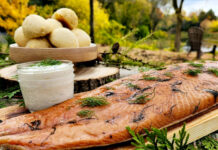Exclusive: Carley Crose, CMP, CIS, Bishop-McCann Program Manager, shares some tasty tips to help planners keep clients and attendees satisfied with a successful F&B experience. Food and beverage is the heart of meetings and events, yet it can also be a burning issue for attendees and clients alike.

With rising costs, increasing dietary needs and “wow” expectations, it can be difficult to pull off a success. So how do you extinguish these F&B concerns?
STOP. Stop expecting your venue or hotel partner to provide 5-star menus on a quick service budget.
Instead, set clear expectations with your client on costs and what their budget will allow. Think about ways you can get creative with the chef. Explore budget-friendly options to enhance simple menus and consider using local vendors or modifying menus for in-season and therefore less expensive produce.
Shake up the format. Would a reception style or buffet work with your group versus a plated dinner? Could heavy appetizers and stations provide a filling meal? Make modifications as you can. This includes modifications to your bar package. Could you construct a contract on consumption versus a package? Would offering beer and wine with a signature cocktail work versus offering a full bar? How about a more cost-effective drink ticket?

DROP. Drop the assumptions. Do you really know what your client wants? Don’t assume that the venue OR the client understands what you mean.
Be clear and specific on ALL of your client’s expectations when it comes to F&B. Presentation, plating, timing, etc. should all be discussed.
Clarify terminology. Buzz words like “elevated,” “unique,” and “fine-dining” may vary from venue to venue and from destination to destination.
Using descriptions, photos, and examples are helpful to set clear expectations. It never hurts to set up a call with your client and vendor to discuss details further.
ROLL. Roll with the ever-growing list of dietary needs.
Ask for dietary needs early and share them with the venue. When at all possible, clarify allergies vs. preferences. This can be a major safety concern for your guests. Often if it is an allergy, the guest will specify. When in doubt, confirm with them.
Ask your hotel or venue to provide specialty menu options when they provide their initial menus. Look for ways to tackle multiple dietary needs with the same dish. Could something be both vegan and gluten free? Or meatless?
Remember, don’t sacrifice the many for the few. Dietary needs are very important, especially allergies. But if you have only a few guests who have requested something different, adjust numbers and selections accordingly.
You want your event to be fire, not to go up in flames. Use these tips to have meaningful conversations with your clients and vendors and have a successful event.
Carley Crose, CMP, CIS, is an accomplished event planner with more than 18 years of experience in designing and executing impactful, value-driven events and incentive travel experiences. Her expertise spans various event formats, from vendor showcases and internal meetings to immersive incentive trips across the globe.
You May Also Be Interested In…
Meeting Costs to Increase in 2025, Report Says
Caesars Expands Wellness to Atlantic City Properties
The Culinary Edge—F&B Innovations Worldwide











